新概念英语第二册Lesson3课件
(最新版) 新概念英语第二册Lesson---3--Please-send-me-a-card
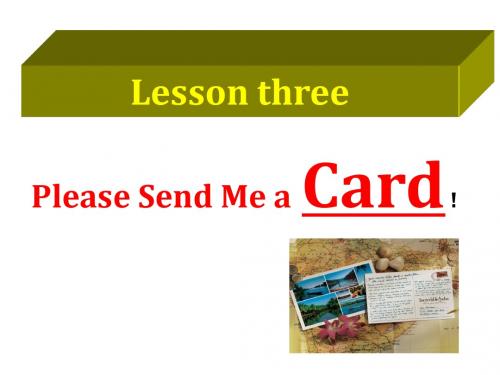
• Spare the rod and spoil the child.
6. friendly adj. 友好的
• He is friendly to us all.
• be friendly to • be rude to
• lovely • lonely
7. public adj. 公共的
• public school • public garden=park
4. lend (lent, lent) v. 借给
• Can you lend me that book?=
• Can you lend that book to me?
• lend sb.sth. = • lend sth.to sb
borrow …from…
• Tom borrowed a book from his teacher0 from a friend.
• single adj. 唯一的, 单一的
Fill in the blanks.
lend 1. I forgot to take my pen. Can you ________ me yours?
2. A lot of people will come to China in 2022. friendly to We Chinese people should be _____________ them.
Lesson three
Please Send Me a
Card
!
1. postcard n. 明信片
• postman
• ID card
• Christmas card • 圣诞贺卡
credit card 信用卡
新概念英语第二册Lesson3
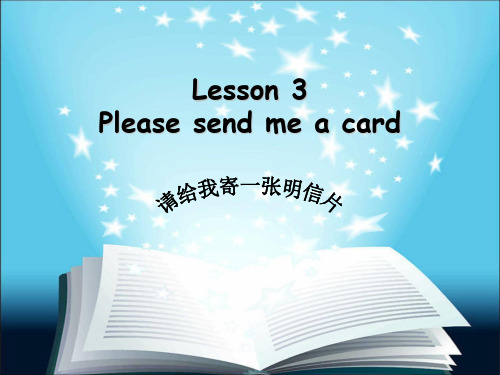
• All the city are busy cleaning the streets. • 2)whole 和 all 可接复数名词,结构也有所不同 • all+限定词+复数名词;the whole of+复数名词 • 例如:All the students are here.
Lend /lend/
• 1)过去式,过去分词:lent lent • 2)lend / borrow 区别 • 借出:lend; lend sth. to sb=lend sb. sth. 例
如:A friendly waiter lent a book to me. • 借进:borrow; borrow sth. from sb. 例如:I
New words
send /send/
1)send sth. to sb. / send sb. sth send a letter 寄信 类似的用法还有 give, take, pass, read, sell, show.. 3aP15 2send / take children to school send / take 区别: take 强调某人亲自送;send 则是通过第三人去送,如美国 的校车。 例如:Tom’s father sends him to school every day. Mary took her son to school yesterday.
borrowed a bike from Ted.
新概念英语第二册 Lesson 3
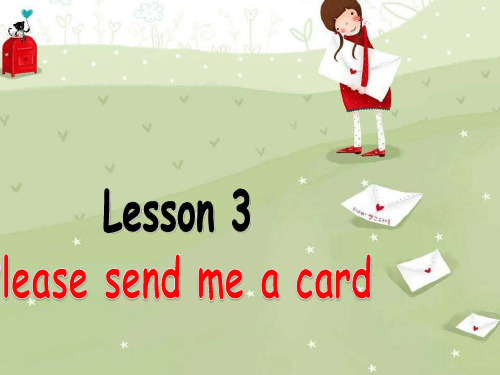
single 单一的 ←→ double 双倍的 single 单身的 ←→ married已婚的
and complete the summary writing!
Postcards always spoil my holidays. Last summer, I went to Italy. I visited museums and sat in public gardens.A friendly waiter taught me a few words of Italian. Then he lent me a book. I read a few lines, but I did not understand a word. Every day I thought about postcards. My holidays passed quickly, but I did not send cards to my friends. On the last day I made a big decision. I got up early and bought thirty-seven cards. I spent the whole day in my room, but I did not write a single card!
• in public 公开的 • in private 私自的,私下里的
Let’s have a conversation in private.
③ n. 公众,群众,大众
the public 公众,民众
The museum is open to the public on Sunday.
5. friendly adj. 友好的
新概念英语第二册lesson-3
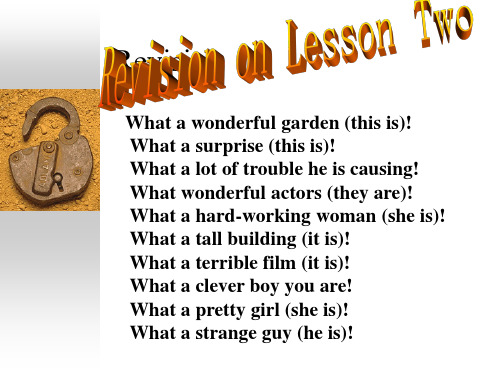
以上三个是指物理上的破坏, 而spoil主要指精神 上
Lend (lent) (lent ) v. 借出
lend sth.to sb=lend sb.sth. Can you lend 50 yuan to me? lend me your ears. 请听过我说。
public house简称pub : 酒吧 ; public place 公共场所. public lavatory ['lævətɔri】 公厕
in public:公开的; in private:私下里的 Let’s have a conversation in private. 让我们私下谈谈? Why not has a conversation in public? 为什么不公开谈呢?(当面说呢?)
Pair discussion!
Now, imagine you are having a trip overseas. And you only have 1, only 1, postcard. Who do you want to send to?
Now, everyone have 3 minutes to tell your partner. Let’s begin!
Germany German
Ireland Irish
Brazil
Brazilian
America American
Greece Greek
Canada Canadian
Australia Australian
新概念英语第二册第3课Please send me a card

新概念英语第二册第3课:Please send me a cardLesson 3 Please send me a card请给我寄一张明信片听录音,然后回答以下问题。
How many cards did the writer send?Postcards always spoil my holidays. Last summer, I went to Italy.明信片总搅得我假日不得安宁。
去年夏天,我去了意大利。
I visited museums and sat in public gardens. A friendly waiter taught me a few words of Italian.我参观了博物馆,还去了公园。
一位好客的服务员教了我几句意大利语,Then he lent me a book. I read a few lines, but I did not understand a word.之后还借给我一本书。
我读了几行,但一个字也不懂。
Every day I thought about postcards. My holidays passed quickly, but I did not send cards to my friends.我每天都想着明信片的事。
假期过得真快,可我还没有给我的朋友们寄过一张明信片。
On the last day I made a big decision. I got up early and bought thirty-seven cards.到了最后一天,我作出了一项重大决定。
我早早起了床,买来了37张明信片。
I spent the whole day in my room, but I did not write a single card!我在房间里关了整整一天。
然而竟连一张明信片也没写成!New words and expressions 生词和短语send (sent,sent)v. 寄,送postcardn. 明信片spoilv. (spoiled or spoilt) v.使索然无味,损坏museumn. 博物馆publicadj. 公共的friendlyadj. 友好的waitern. 服务员,招待员lend(lent, lent)v. 借给decisionn. 决定wholeadj. 整个的singleadj. 唯一的,单一的Notes on the text课文注释1 a few words 几句话2 lent me a book中,lent是“借出”的意思。
新概念英语第二册Lesson 3

Lesson 3 Please send me a cardPhrase:1. in public gardends 在公园里2. on the last day 在最后一天3. every day 每天4. make a decision 决定5. think about 想到,想6. not a single 连一个都没有Intensive Reading:1.but是连词,用来连接两个简单句,表示转折关系,它前面一般要用逗号点开。
but决不能与(al)though连用,注意中英文的区别。
eg. She was tired, but she went to work. (√) Although she was tired, but she went to work. (×) 2.spend 花费,度过,经常与on连用。
eg. Roy spent a lot of money on records.spend 常用句型为:spend…doing/ on sth. eg. He’s spent half his life writing this book.3.think about 意为“考虑”,think后不能直接加名词作宾语,而要借助合适的介词。
eg. think about a question 想问题,think of you 想你。
但think后加句子时不需介词,eg. I think he will come soon.4.make a big decision 意为“下大决心”,英语中make和take是两个搭配能力很强的动词,后接名词可组成许多不同的词组,但一般来说make和take不可互换使用,而分别与一定的名词搭配。
eg. make the bed, take a rest .Key Structure:1.一般过去时:A. 用法:描述已经执行和完成了的行为动作,但与现在的情况没有联系,而且必须跟确切的时间状语连用。
新概念英语第二册Lesson3pleasesendmeacard课件
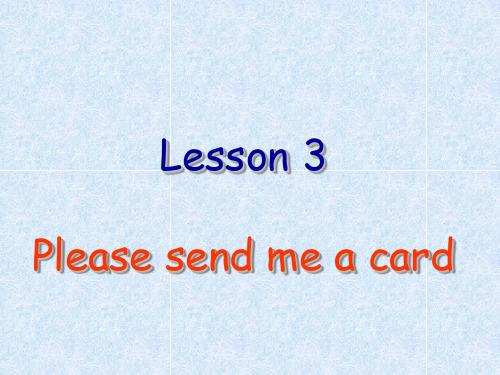
假期过得真快,可我还没有给我的朋友们寄过一张明信片。
My holidays passed quickly,
but I did not send cards to my friends.
到了最后一天,我作出了一项重大决定。
On the last day, I made a big decision.
• 1.send sb. sth= send sth. to sb.
• 2. lend sb. sth.= lend sth. to sb.
• 3. spend v. 花费(人做主语) spend+time/money+ on sth.
•
(in) doing sth.
• 4. make a decision 做决定
Lesson 3 Please send me a card
Beautiful Sentence
• To the world you may be one person, but to one person you may be the world.
• 对于世界而言,你是一个人;但 是对于某个人,你是他/她的整个 世界。
2 WWhhaattdbidigthdecyisdionafdtiedr the mwreiatle?r make? He got up early and bought thirty-seven cards.
3 W ?Honohwathtmehaalnapysptecndaeraddys?inditdhethmeidwdrlieteorf sthenednight He did not write/send a single card.
新概念英语第二册Lesson3课件

3. spoil v. 使索然无味,损坏
4. museum n. 博物馆 5. public adj. 公共的
高斌制作
New words and expressions
1. friendly adj. 友好的
2. waiter n. 服务员,招待员
3. lend v. 借给 4. decision n. 决定 5. whole adj. 整个的
间人直物
间 接 宾 语 直 接 宾 语
双宾语
高斌制作
3. museum n. 博物馆
• the Palace Museum • 故宫博物院
• children's museum • 儿童博物馆
• science museum • 科学博物馆
高斌制作
高斌制作
大英博物馆 ——— (The British Museum)
高斌制作
Postcards always spoil my holidays. Last summer, I went to Italy. I visited museums and sat in public gardens. A friendly waiter taught me a few words of Italian. Then he lent me a book. I read a few lines, but I did not understand a word. Everyday I thought about postcards. My holidays passed quickly, but I did not send cards to my friends. On the last day I made a big decision. I got up early and bought thirty-seven cards. I spent the whole day in my room, but I did not write a single card!
新概念第二册ppt课件

• 5 ---地点状语,一般在方式副词之后,时间副词之前
• 6 ---时间状语,可以放在句首或句末
• 简单陈述句一定不能少的是主语, 谓语.
• 如果问何时何地,是一个固定搭配 when and where
2021/7/31
Exercises
• Put the phrases in to correct order
2021/7/31
★ pay vt. &vi. 支付
① vt. &vi. 支付(价款等) eg. Have you paid the taxi-driver?
★ pay…for sth. 花/支付……(钱)买……
eg. I paid 50 dollars for this skirt.
2021/7/31
2021/7/31
直到
• until用于表示动作、状态等的持续,可译为“一直到……为止”或 “在……以前”。
• His father was alive until he came back. 直到他回来为止,他爸爸 都是活着的.
• His father didn‘t die until he came back. 直到他回来,他爸爸才死
adv. 外面
• ring (rang, rung) v.
(铃、电话等)响
• aunt
n. 姑,姨,婶,舅母
• repeat
v. 重复
2021/7/31
【课文讲解】
2、I never get up early on Sundays. • on Sundays: 所有的星期天,每逢星期天,与一般现在时连用,表示经常性
adj. 私人的 n. 谈话 n. 剧场,戏院 n. 座位 n. 戏 adv. 大声地 adj. 生气的 adv. 生气地 n. 注意 v. 容忍 n. 事 adv. 无礼地,粗鲁地
新概念英语第二册 Lesson3 (共25张PPT)

• 3)decide / make up one’s mind 区 别
• decide 指经过考虑对疑难问题、争 端等做出决断,含有下决心取舍的 意思。decide 后常接动词不定式和 从句。
• make up one’s mind 指毫不犹豫的 做出决定,意味着“打定主意,下 定决心”。后常接动词不定式,一 般不接从句。
New words
1.send v. 送 派送 send sth. to sb. / send sb. sth 送给某人某物 nd a letter 寄信
send / take 区别: take 强调某人亲自送; take sth to sb 给某人送某物 send 则是通过第三人去送
与send搭配的常用短语
5.single 1)唯一的,单一的: 反义词 double
2)未婚的,独身的: 反义词 married 已婚的
• 6.postcard n. 明信片 卡片 • 有关card词组: • ID card身份证 • credit card信用卡
• 7.museum n. 博物馆 • 扩展: • the Palace Museum 故宫 • the Summer Palace颐和园 • the science museum 科学博物馆
现在进行时:
1.概念:表示现阶段或说话时正在发生的动作或行为。
2.结构:肯定句: 主语+ am/is/are + Ving + 其他. 否定句: 主语+ am /is/are +not + Ving + 其他. (1.在am/is/are后加not. 2.some → any)
一般疑问句:Am/Is/Are+主语 +Ving + 其他 ?
新概念英语第二册Lesson3

Notes on the Text
Postcards always spoil my holidays. Last summer, I went to Italy. last: ① adj. 上一个 last summer里的last表示 “上一个” 上周日你干什么了? What did you do last Sunday?
2.Every day I thought about postcards. think about/of 考虑, 思考 你觉得天气怎么样? What do you think of the weather today? think of 想到 你想到什么了? What do you think of? think over 仔细考虑,反复思考
borrow v. 借
borrow sth. from sb. 不能用 borrow sb. sth. (×) 他昨天借了我的笔。 He borrowed a pen from me yesterday. 如果我们使用信用卡这意味着我们从银行借 钱。 If we use credit cards it means that we borrow money from the banks.
On the whole 总的来说,一般来讲 总的来说,我同意你的决定。 On the whole, I agree with your decision. 总的来说,我部分同意这个观点。 On the whole, I agree with this opinion to some extent.
My holidays passed quickly, but I did not send cards to my friends. Pass 1)经过 我们经过该镇而未停留 We passed the town without stopping. 2)<时间>经过,过去 自从他前往法国, 已过了两年 Two years has passed since he left for France. 许多年已经过去了我仍记得这个有趣的故事 Many years has passed I still remember the interesting story.
Lesson 3 Please send me a card(课件)新概念英语第二册

Please send me a card. 请给我寄一张明信片
Lesson 3 Please send me a card
Learning objectives: • Be able to listen and comprehend the text • Be able to make sentences with the new • words and phrases • Be able to retell and do summary writing • Be able to use the direct objects and indirect • objects after verbs
postcard
Did you make a dicision to send a postcard to your friend?
be friendly to sb. send a postcard to sb. make a decision to do sth. do sth. in public
Let's put them together and beautify it .
Postcards always spoil the winter’s holiday. Last summer, he spent his holidays in Italy. And he thought about postcards every day. Because He didn’t send any cards to his friends. He bought 37 cards on the last day. And he stayed in his room all day. But he didn’t write any cards.
新概念英语第二册lesson 3

I spent the whole day in my room, but I did not write a single card! 1. spend – spent – spent 花费,消费 sb spend some time (in) doing sth 花费某人多长时间去做某事= =It taks sb some time to do sth 我花费了两个小时时间玩电脑游戏。 I spend two hours in playing computer games. =It takes me two hours to play computer games. 2. write – wrote – written 写 write out 写出 write down 写下,记下
1. send – sent – sent 寄一封信/卡片/电子邮 send a letter/ card / e-mail • send sb sth = send sth to sb 送/寄给 某物给某人 她寄给我一张圣诞卡片。 She sent me a Christmas card. =She sent a Christmas card to me. 3. send sb to sw. 送某人去某地
★ friendly adj 友好的
1. 以-ly 结尾却是形容词。这样的词还有,
lovely adj 可爱的
★ waiter n. 服务员,招待员
waitress
n. 女服务员
1. lend – lent – lent 借出 lend sb sth / lend sth to sb 你能借给我你的汽车吗? Can you lend me your car? =Can you lend your car to me? 2. borrow 借入 borrow sth from sb / borrow sb sth 他刚刚借了汤姆100元。 He borrowed 100 yuan from Tom just now.
新概念英语第二册课课件 Lesson

•A public house which was recently bought by Mr. Ian Thompson is up for sale.
•a public house 酒吧、酒店,口语缩略为pub •up for sale 有待出售,供出售 •be up for 有待于…,为了某一目的 •This problem is up for discussion. •这个问题有待于讨论。 •on sale 打折卖 for sale 待售;出售
• ★shake(shook,shaken) v. 摇动 • vt.&vi. 摇,摇动,抖动 • Mr. Thompson shook his head. • His hands appear to be shaking. • 他的手看上去在发抖。 • ② vt. 同…握手 • Dan shook hands with him.
A public house which was recently bought by Mr. Ian Thompson is up for sale. Mr.Thompson is going to sell coming from the bar. The next morning, he found that the doors had been blocked by chairs and the furniture had been moved. Though Mr.Thompson had turned the lights off before he went to bed, they were on in the morning.He also said that he had found five empty whisky bottles which the ghost must have drunk the night before. When I suggested that some villagers must have come in for a free drink, Mr.Thompson shook his head. The villagers have told him that they will not accept the pub even if he gives it away.
新概念英语第二册课文 (3)

新概念英语第二册课文Lesson 1 - A private conversationSarah: Good morning, John. How are you today? John: Good morning, Sarah. I’m fine, thank you. How about you? Sarah: I’m great. I wanted to talk to you about something private. John: Sure, go ahead. What’s on your mind? Sarah: Well, I’ve been offered a new job and I’m thinking about taking it. But I wanted to get your thoughts before making a decision. John: That’s great news, Sarah. I’m happy for you. Can you tell me more about the job offer? Sarah: It’s a sen ior position with a higher salary and more responsibilities. However, it also requires relocation to a different city. John: I see. That’s a big decision to make. Have you considered the pros and cons? Sarah: Yes, I’ve thought about it a lot. On one hand, it’s a great opportunity for career growth and financial stability. On the other hand, I’ll have to leave my friends and family behind. John: It’s definitely a tough choice. But sometimes, taking risks and stepping out of our comfort zone can lead to amazi ng opportunities. Sarah: That’s true. I’m excited about the new challenges, but I’m also worried about leaving everything behind. What do you think I should do? John: Ultimately, the decision is yours, Sarah. You have to weigh the benefits and drawbacks an d decide what’s best for your career and happiness. Don’t rush into a decision, take your time to think it through. Sarah: Thank you, John. Your advice means a lot to me. I’ll take some more time to think about it before making a final decision. John: You’re welcome, Sarah. I’m here to support you no matter what you decide. Good luck!Lesson 2 - Shopping for clothesClerk: Good afternoon, madam. How can I assist you today? Maggie: Good afternoon. I’m looking for a dress to wear to a special event. Clerk: We have a wide range of dresses. What style and color are you looking for? Maggie: I would like a classic black dress, something elegant and not too flashy. Clerk: Alright. What size are you? Maggie: I’m not sure. Could you help me with the measurements? C lerk: Of course. Please stand straight and I’ll measure you. Maggie: Thank you. Clerk: Your bust measures 34 inches, waist measures 28 inches, and hips measure 36 inches. Based on these measurements, I would recommend a size 8 or 10. Maggie: Thanks for you r help. I’ll try on both sizes. Clerk: Certainly, madam. The fitting room is right over there. Let me know if you need any assistance. Maggie: Will do, thank you. [After trying on the dresses] Maggie: I tried on both sizes, but I think the size 8 fits me b etter. It’s more comfortable and looks great. Clerk: I’m glad you found the right fit. Is there anything else I can help you with? Maggie: No, thank you. I’m happy with my choice. How much is the dress? Clerk: The black dress is on sale for $100. Maggie: P erfect. I’ll take it. Clerk: Great. Let me ring it up for you.Lesson 3 - At the airportAnnouncer: Attention, please! Flight SV214 to London is now boarding. Passengers are requested to proceed to Gate 14. Passenger 1: Excuse me, is this the right gate for flight SV214 to London? Airport Staff: Yes, it is. Boarding has just started, please proceed to the gate. Passenger 2: How long does the boarding process usually take? Airport Staff: It depends on the flight and the number of passengers. It usually takes around 30 minutes to complete boarding. Passenger 1: Is there any special procedure for carry-on luggage? Airport Staff: Yes, you are allowed one carry-on bag and one personal item. Please make sure they meet thesize and weight restrictions. Passenger 2: Can I bring my laptop bag as a personal item? Airport Staff: Yes, a laptop bag is considered a personal item. It should fit under the seat in front of you. Passenger 1: What about liquids? Can I bring a bottle of water with me? Airport Staff: You are allowed to bring small containers of liquids, but they must be in a clear, resealable plastic bag. Each container should be no more than 100ml. Passenger 2: Thank you for the information. We’ll make sure to follow the regulations. Airport Staff: You’re welco me. Have a pleasant flight!This document includes three lessons from the book。
新概念英语第二册Lesson3

Key words
and expressions(Lesson3)
v.寄,送
★ send
• send sth. to sb. = send sb. sth. 给某人送(寄)什么东西
• send a letter 寄信
• send/take children to school • take和send的区别: 1. take强调某人亲自送。 2. send则是通过第三人去送。
a friendly face/smile be friendly to/towards sb. • 他对约翰不友好。 He is not very friendly to John.
• in a friendly way作为状语表示这个人做什么事情
很友好。 • 他友好的向我招手。
He waved to me in a friendly way. lovely也是 adj.
Questions on the text
1. Where did the writer spend his holiday last summer?
He spent his holiday in Italy last summer.
2. Why didn’t he enjoy his holidays?
★single
adj. 单身的, 单程的, 单一的
• a single bed单人床 • a single ticket单程票 • single 单一的←→ double 双倍的 • single 单身的←→married已婚的
★ last:
• ① adj. 上一个 • last summer • 上周日你干什么了? • What did you do last Sunday? • ② adj. 最后一个,要加冠词the • the last day 最后一天 • 我们坐最后一班公交车回的家。 • We caught the last bus home.
新概念英语第二册lesson 3
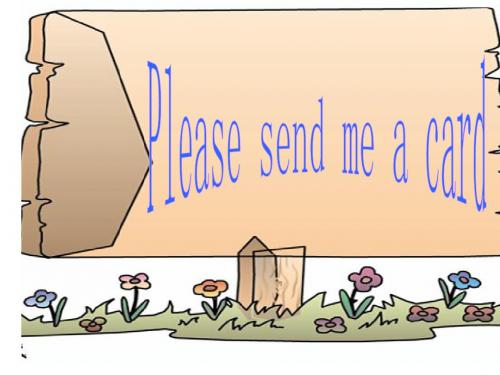
Oral Composition: 1. postcards – spoil – holiday 2. summer – Italy 3. museums – sat – gardens 4. waiter – few – Italian 5. lent – book, but – understand 6. Every day – thought – postcards 7. holidays – quickly -- not – cards -- friends 8. last day – decision 9. early – 37 cards 10. whole day – room – not – single card
Talking points: 1. How did you spend your holidays last year? Where did you go and what did you do? 2. Talk about some of the things that can spoil a holiday. 3. What is the best way to learn a foreign lang2. 3. 4. 5. 6. 7. 8. 我参观了博物馆,还去了公园。 一位友好的服务员教了我几句意大利语。 我读了几行,但是一个字都不懂。 我的假期过得很快,但是我还没有给我的朋友们寄去一张明信片。 到了最后的一天, 我作出一个重大的决定。 我在房间里一整天,但我一张明信片都没有写。 我的父母上星期买了一部手提电脑给我。 这些蚂蚁花了半天的时间才把这小块面包搬回家。
Comprehension Questions: 1. What always spoils your holidays? 2. Where did you go last summer? 3. What did you visit? 4. Where did you sit? 5. Did you learn a little Italian? 6. Who taught you? 7. What did he lend you? 8. Did you understand what you read? 9. How often did you think about postcards? 10. Did your holiday pass quickly? 11. Did your friends receive any cards from you? 12. What did you do on the last day? 13. When did you get up? 14. How many cards did you buy? 15. You didn’t send any cards to your friends, did you?
- 1、下载文档前请自行甄别文档内容的完整性,平台不提供额外的编辑、内容补充、找答案等附加服务。
- 2、"仅部分预览"的文档,不可在线预览部分如存在完整性等问题,可反馈申请退款(可完整预览的文档不适用该条件!)。
- 3、如文档侵犯您的权益,请联系客服反馈,我们会尽快为您处理(人工客服工作时间:9:00-18:30)。
• • • • • • •
4.museum /mju:`ziEm/ n. 博物馆 例如:Last week I went to the science museum. 1)扩展:the Palace Museum 故宫 the Summer Palace颐和园 the science museum 科学博物馆 6.friendly / `frendlI/ adj.友好的 1)构词法:名词 friend+ly 构成形容词;类似的词: lovely, fatherly, brotherly… • 2)反义词:unfriendly • 3)短语:in a friendly way 例如:They talked each other in a friendly way. • be friendly to sb. 例如:Mr. Lee is very friendly to us .
• 9.decision /dI`sIVEn/ n.决定 • 1)make a big/great decision=make decisions=make up one’s mind • 例如:Today I made a big decision. • 2)v. decide decide to do sth. • 例如:I decided to buy a new car.
与send搭配的常用短语
• send for 召唤,派人去叫 Did you send for a taxi? 你刚才叫出租车了吗? • send out 发出,发送 • 遣送,解雇 • send back 归还 • send in 提交 派遣 • send up 发射,使...上升
spoil /spɔɪl/
spend /spend/
• v. 用,花销 spend somemoney/sometime on sth / on doing sth spend 300 yuan on a new TV-set spend much time on sports I spend 10 years to learn English well. We spend 3 hours on the NBA final games last night.
各种卡片的英文说法
• • • • • • • • • birthday card 生日卡 Christmas card 圣诞卡 New-Year card 新年卡 Identity card 身份证 preferential card 优惠卡 student card 学生证 score card 积分卡 membership card 会员卡 intelligence card IC智能卡 • entry card 入境卡
• • • • • • • • • • • •
• • •
10.whole / hEul/ adj.整个的 whole / all 区别 whole 和 all 都有“全部的”意思,但其用法有区别: 1)whole 和 all 都可用在表示整体的单数名词之前,但限 定词的位置不同 all+限定词+单数名词;限定词+whole+单数名词 例如:The whole city are busy cleaning the streets. All the city are busy cleaning the streets. 2)whole 和 all 可接复数名词,结构也有所不同 all+限定词+复数名词;the whole of+复数名词 例如:All the students are here. The whole of the students went to the cinema. 3)whole 一般不能修饰不可数名词或物质名词。修饰复数 名词时,一般其前有数量词。而 all能用于各种情况 例如:Tom drank all the water in the bottle. My father will stay in bed for three whole days.
single /sɪŋgl/
1)唯一的,单一的:反义词 double 例如:There wasn’t a single bus in the stree 2)未婚的,独身的:反义词 married 已婚的 例如:She is stll single now.
• 1)postcard=card • 2)ID card身份证 credit card信用卡 cash card 现金卡 namecard / visiting card名片 • 例如:Here is my name card.
Lesson 3 Please send me a card
Lead-in
How many cards did the writer send? • What did he think about everyday? What did he think about everyday? What did he think about What did he think about everyday? every day?
New words
send /send/
1)send sth. to sb. / send sb. sth send a letter 寄信 类似的用法还有 give, take, pass, read, sell, show.. 3aP15 2send / take children to school send / take 区别: take 强调某人亲自送;send 则是通过第三人去送,如美国 的校车。 例如:Tom’s father sends him to school every day. Mary took her son to school yesterday.
Explain the text
• 1)a little Italian:语言不可数,所以要用 a little Italian 或 a few words of Italian • a little / little / a few / few 的区别: • a little / a few 都用肯定句,分别表示“有一点”和“有几 个”,但 a little 修饰不可数名 • 词;a few 修饰可数名词复数 • little / few 都用否定句,分别表示“没有多少”和“没有 几个”,但 little 修饰不可数名词; • few 修饰可数名词复数
2) teach sb.sth. = teach sth. to sb. lend sb. sth. = lend sth. to sb. send sth. to sb. = send sb. sth 双宾语 英语中许多动词带两个宾语,即直接宾语和间接宾语。 间接宾语通常是人,直接宾语通常是物。 例如:He lent me a book. = He lent a book to me. He bought me a book. = He bought a book for me. 间接宾语人在后面时,其前必须加间接宾语人在后面时,其 前必须加间接宾语人在后面时,其前必须加间接宾语人在 后面时,其前必须加 to(对…而言)或for(为…而做) 例如:Please give a book to me. I bought a book for you He took flowers to his wife. She ordered soup for you.
• 3)decide / make up one’s mind • decide 指经过考虑对疑难问题、争端等做出决 断,含有下决心取舍的意思。Decide 后常 • 接动词不定式和从句。 • 例如:The boy decided to become a sailor. • They couldn’t decide what they should do next. • make up one’s mind 指毫不犹豫的做出决定, 意味着“打定主意,下定决心”。Make up’s made up his mind to be a doctor. • I’ve made up my mind to buy a new car
Listen to the tape
How many cards did the writer send?
•
Postcards always spoil my holidays. Last summer, I went to Italy. I visited museums and sat in public gardens. A friendly waiter taught me a few words of Italian. Then he lent me a book. I read a few lines, but I did not understand a word. Everyday I thought about postcards. My holidays passed quickly, but I did not send cards to my friends. On the last day I made a big decision. I got up early and bought thirty-seven cards. I spent the whole day in my room, but I did not write a single card!
public /'pʌblik/
• 1)公共的:public school / place / house (pub 酒吧) • 2)反义词:private • 3)短语:in private 私下里的 ----- in public 公开的 • 例如:Why not have a conversation in public? • We are good friends in private .
